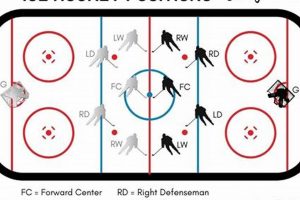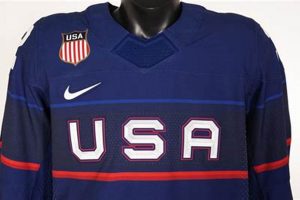The selection of imaginative and funny identifiers for simulated ice hockey clubs represents a popular facet of participation in online leagues. These monikers, often playing on words, pop culture references, or the names of actual players, serve as a lighthearted expression of team owner personality within the competitive environment. An example might include a pun on a well-known player’s name or a humorous allusion to hockey culture.
The practice of crafting humorous identifiers fosters camaraderie among league members and enhances the overall enjoyment of the activity. These names can add a layer of entertainment to the competition, transforming simple scoring updates and roster management into opportunities for amusement and friendly banter. Historically, such playful nomenclature has been a cornerstone of recreational sporting leagues, online communities, and other forms of social interaction.
The subsequent discussion will delve into specific examples of successful funny hockey team identifiers, explore strategies for creating original and memorable names, and consider the cultural significance of humor within the context of fantasy sports.
Tips for Generating Imaginative Ice Hockey Team Identifiers
Selecting an appropriate and memorable identifier for a fantasy ice hockey team requires careful consideration. The following guidelines aim to assist in the creation of inventive and engaging names.
Tip 1: Incorporate Wordplay: Leverage puns, alliterations, and double entendres based on player names, team names, or hockey terminology. For instance, a team featuring Sidney Crosby might be named “Sid the Kidneys” (a play on “Sid the Kid”).
Tip 2: Reference Popular Culture: Integrate elements from movies, television shows, music, or current events into the team’s identifier. A team drawing inspiration from a popular show might be named “The Mandalorian’s Goalden Knights.”
Tip 3: Utilize Player Nicknames: Many professional players have established nicknames that can be creatively adapted. A team utilizing Alex Ovechkin could become “Ovi Wan Kenobi” combining his nickname with a Star Wars reference.
Tip 4: Employ Location-Based Humor: If the fantasy league has a geographical element, incorporate local landmarks or cultural references into the identifier. A team from Philadelphia might be called “The Liberty Bell Bombers.”
Tip 5: Consider Rhyme and Rhythm: A name that is both catchy and easy to remember can contribute to its effectiveness. “The Puck Stops Here” or “Goal Diggers” are examples of rhyming structures.
Tip 6: Avoid Offensive Content: Ensure that the chosen identifier is respectful and does not contain any language that could be considered discriminatory or offensive to other league members.
Tip 7: Test for Memorability: Before finalizing the choice, evaluate how easily the identifier is recalled and its overall impact on other participants. A memorable name increases engagement and enhances the league’s dynamic.
Adhering to these suggestions can help prospective team owners craft an identifier that is both amusing and reflective of their personal style, contributing to a more enjoyable fantasy hockey experience.
The subsequent section will discuss the legal and ethical ramifications of naming, focusing on respecting intellectual property and maintaining a professional environment.
1. Creativity
Creativity serves as the foundational element for the generation of amusing team identifiers in fantasy hockey leagues. Without the infusion of inventive thought, names risk being generic, uninspired, and ultimately, failing to elicit the desired humorous response. The presence of creativity distinguishes a memorable identifier from a forgettable one, directly impacting engagement and recognition within the competitive league environment. A team named “The Fighting Lemurs,” while perhaps inoffensive, lacks the creative spark required to be considered genuinely funny. In contrast, a name such as “Crosby, Stills, and Nashvilles” demonstrates creative wordplay and clever association, thereby enhancing its comedic impact.
The importance of creativity extends beyond mere amusement. Identifiers that exhibit originality and wit can foster a sense of camaraderie among league members, turning the act of reviewing team names into an anticipated event. Furthermore, creative names often reflect the team owner’s personality and strategic approach, offering a glimpse into their approach to the game itself. For example, an owner known for aggressive trading may choose an identifier like “The Trade Deadline Disasters,” signaling their penchant for high-risk maneuvers. Similarly, “The Salary Cap Casualties” demonstrates a creative play on team budget and player drafting strategy.
In summary, creativity is not merely a desirable trait but an essential ingredient in the construction of successful and amusing fantasy hockey team identifiers. Its presence elevates a name from the mundane to the memorable, fostering engagement and contributing to the overall enjoyment of the league. The challenge lies in finding the balance between originality, relevance, and appropriateness, ensuring that the creative output is both humorous and respectful within the competitive context.
2. Relevance
Relevance is a critical attribute in the creation of amusing fantasy ice hockey team identifiers. Without it, a name, regardless of its inherent humor, may fail to resonate with league members or capture the spirit of the game itself, diminishing its overall effectiveness.
- Contextual Alignment
An identifier’s connection to current hockey events, player performances, or league dynamics significantly enhances its humorous impact. A name that references a recent trade, a significant injury, or a notable on-ice event demonstrates contextual awareness and elevates the humor beyond simple wordplay. For example, following a goaltender’s statistically poor performance, “The Sieve Dreams” resonates more effectively than a generic pun.
- Player-Based Association
Identifiers that cleverly incorporate player names, nicknames, or playing styles often achieve a higher degree of relevance. This direct association creates an immediate connection for league members familiar with the players in question, amplifying the humor and making the name more memorable. “McDavid’s Oilers” provides a direct link to a top player, allowing for further wordplay or humorous adaptation.
- Theme Consistency
If a fantasy league operates under a specific theme or set of rules, aligning identifiers with that framework can enhance relevance and comedic effect. A league with a focus on historically significant players might benefit from names such as “The Howe Do You Dos” or “The Orr Else Whats,” ensuring that the humor is grounded in the league’s specific context.
- League History Awareness
Identifiers that reference past events or memorable moments within a particular fantasy league create a sense of shared history and inside humor. A team name that alludes to a previous season’s championship winner or a particularly disastrous trade can generate a higher level of amusement and camaraderie among league veterans. This insider knowledge enhances the connection, making the identifier particularly resonant for those in the know.
The integration of these elements ensures that the resulting identifier, while intended to be humorous, maintains a strong connection to the fantasy hockey environment, player and team dynamics, and league history. By grounding the humor in relevance, identifiers become more engaging, memorable, and impactful, ultimately contributing to the overall enjoyment of the league.
3. Humor
Humor constitutes the central driving force behind the effectiveness and appeal of creative identifiers for fantasy ice hockey teams. Its presence transforms a functional designation into a source of amusement and camaraderie within the competitive environment. The successful application of humor distinguishes a memorable identifier from an otherwise unremarkable one.
- Wordplay and Puns
The deployment of wordplay, particularly puns that leverage player names, hockey terminology, or team locations, represents a primary avenue for injecting humor. The effectiveness of this approach hinges on the audience’s familiarity with the source material and the cleverness of the linguistic twist. For example, a team name such as “The Gretzky Effect” puns on a historical hockey term, while something like “Kopitar, Line, and Sinker” plays on a current player’s name, offering direct contextual humor.
- Satire and Irony
Satirical or ironic team identifiers can derive humor from unexpected juxtapositions or understated commentary on the sport itself. An identifier such as “The Injury Reserve All-Stars,” referencing a team beset by injured players, derives humor from the unfortunate reality of player injuries. Similarly, a high-scoring, defensively weak team might adopt “The Shutdown Specialists” as an ironic statement.
- Self-Deprecating Humor
Team names that employ self-deprecating humor can generate goodwill and relatability, particularly in the context of less successful teams. Adopting an identifier such as “The Last Place Legends” or “The Waiver Wire Wonders” can demonstrate humility and self-awareness, transforming perceived failure into a source of amusement. In the context of fantasy hockey, a team naming themselves “The Goal Suckers” showcases a humorous acceptance of their scoring misfortune.
- Pop Culture References
Integration of pop culture references into team identifiers can appeal to a broader audience, provided the reference is both relevant and recognizable. The use of movie titles, song lyrics, or meme culture allows for a creative overlay of humor onto the traditional hockey framework. A team named “Game of Throw-ins,” or “Stranger Pucks” shows such references of popular media.
The successful incorporation of humor into these identifiers is thus a nuanced practice that depends on the team owner’s understanding of both the sport and the audience. The strategic deployment of these techniques contributes to the creation of identifiers that are not only humorous but also memorable and engaging, ultimately enhancing the fantasy hockey experience.
4. Memorability
Memorability represents a crucial characteristic of highly effective funny team identifiers within fantasy ice hockey leagues. Its presence extends beyond mere amusement, influencing engagement, recognition, and overall league dynamics.
- Association and Recall
An identifier’s memorability hinges on its ability to establish strong associations within the minds of league members. Names that effectively link to player identities, team histories, or prevailing cultural trends become more readily recalled. “Ovechkin Impossible” creates a readily rememberable name, making team recall very high. High recall also builds brand recognition and allows long retention for each team.
- Sound and Rhythm
The phonetic structure of an identifier significantly contributes to its memorability. Names that employ rhyme, alliteration, or a catchy rhythm are more likely to be retained by participants. “The Puck Stops Here” uses rhyming structure, making the identification memorable. It ensures team owners create an easier image that is long lasting and easy to remember in the long run.
- Visual Imagery
Identifiers that evoke strong visual imagery enhance memorability by creating a mental picture associated with the team. A name such as “The Zamboni Zombies” conjures a vivid image that aids in recall. If an organization is trying to implement a marketing campaign, then an easy to remember name will allow for easy outreach and brand recognition. For the team to be great, it must have strong imagery and recall.
- Emotional Resonance
Team names that elicit an emotional response, whether through humor, nostalgia, or surprise, are more likely to be remembered. An identifier such as “The Cardiac Kids” (if the team has a history of close games) generates a sense of emotional resonance which heightens memorability. If a team wants to have a long-lasting image, they must have some form of emotional connection for fans to connect.
The combined effect of association, sound, visual imagery, and emotional resonance directly impacts the memorability of identifiers for fantasy ice hockey teams. Those characteristics become more recognizable, contributing significantly to league engagement and fostering a greater sense of camaraderie among participants. Without all of this working in tandem, teams will fade from relevance.
5. Originality
Originality serves as a key differentiator in the realm of humorous identifiers for simulated ice hockey teams. The cause-and-effect relationship is such that a novel and inventive name is far more likely to generate laughter and recognition than a derivative or commonplace one. The value of originality in creating amusing team names lies in its capacity to surprise, intrigue, and resonate uniquely with league participants, setting a team apart from the multitude. Without originality, names become repetitive and lose comedic impact. For instance, while a generic name like “The Hockey Pucks” might be functional, it lacks the originality to elicit amusement. In contrast, a name such as “The Zamboni Drivers Union” demonstrates originality by combining a common hockey element with an unexpected organizational structure, thereby enhancing its humorous appeal.
The practical significance of understanding this relationship becomes evident in fantasy league dynamics. An original identifier increases team visibility, fosters a sense of identity, and encourages engagement among league members. Furthermore, it reflects the team owner’s creativity and commitment to the league, potentially influencing perceptions of their strategic acumen. This concept applies to real-world branding, where unique and memorable names are essential for product recognition and marketing success. In fantasy hockey, originality allows players to express their humor which enables higher engagement.
In summary, originality significantly contributes to the creation of humorous identifiers for fantasy ice hockey teams. Its presence amplifies the comedic impact, fosters engagement, and enhances team recognition within the league. While challenges exist in consistently generating novel ideas, prioritizing originality remains essential for crafting identifiers that are both amusing and memorable, supporting the goal of an enjoyable and competitive fantasy hockey experience.
6. Appropriateness
Appropriateness is a critical, though often understated, consideration in the selection of humorous identifiers for simulated ice hockey teams. The potential for humor to cross into offensive or exclusionary territory necessitates careful evaluation, ensuring that team names contribute positively to the league’s social dynamic.
- Respect for Persons and Groups
Identifiers should avoid content that could be interpreted as discriminatory, hateful, or disrespectful toward any individual, group, or community. Names that target specific demographics or incorporate slurs, stereotypes, or pejoratives are deemed inappropriate and undermine the spirit of friendly competition. For instance, identifiers that mock race, gender, religion, or sexual orientation are unacceptable and run contrary to promoting inclusive participation.
- Professionalism and League Image
While the primary goal is amusement, names that are excessively vulgar, graphic, or sexually suggestive may be deemed inappropriate depending on the league’s demographics and established rules. Organizers often set guidelines to establish a baseline of decorum to ensure the environment remains conducive to all participants, including those with varying sensibilities. For example, an identifier using explicit language or depicting graphic content is unsuitable for a family-oriented league.
- Relevance and Contextual Awareness
Humorous references to sensitive subjects or current events require a high degree of contextual awareness and consideration for potential impact. Topics such as political events, disasters, or tragedies may be unsuitable for lighthearted jest, regardless of intent. It is vital to assess how a team name might be perceived by others, especially those directly affected by the referenced event. For instance, making light of a natural disaster or global crisis would be deemed insensitive and inappropriate.
- Adherence to League Rules and Guidelines
Most fantasy leagues establish specific rules governing team names, covering aspects such as length, character restrictions, and prohibited content. Adhering to these rules is a fundamental aspect of appropriateness, demonstrating respect for the league’s organizational structure and its participants. League rules often function to promote fairness and a shared understanding of appropriate conduct.
The multifaceted consideration of appropriateness underscores its significance in the selection of humorous team names. While originality and wit are valued, they should not supersede the need for respect, inclusivity, and adherence to established guidelines. The ultimate goal remains to foster a fun and engaging competitive environment where all participants feel welcomed and respected.
Frequently Asked Questions Regarding Hilarious Fantasy Hockey Team Identifiers
This section addresses common inquiries and misconceptions surrounding the selection and use of amusing names for simulated ice hockey teams.
Question 1: What constitutes an effective, amusing team identifier?
An effective identifier generally blends humor with relevance, originality, and memorability. It often incorporates wordplay, references to hockey culture, or player names in a creative and engaging manner.
Question 2: Are there restrictions on the type of identifier that can be used?
Yes, most leagues implement rules prohibiting names that are offensive, discriminatory, or excessively vulgar. The objective is to maintain a respectful and inclusive environment for all participants.
Question 3: How can an original identifier be generated without resorting to clichs?
Originality can be achieved by exploring niche hockey references, combining player names with unexpected elements, or drawing inspiration from current events outside of sports.
Question 4: Does the length of the identifier impact its effectiveness?
While brevity can enhance memorability, the overall impact is determined more by the identifier’s wit and relevance than its length. Shorter names tend to stay in the mind, but that doesn’t negate the impact of a longer joke.
Question 5: How important is it to consider the other league members’ sense of humor?
Understanding the league’s culture and the sensibilities of its participants is crucial. Humor that resonates with the target audience is more likely to be well-received and contribute positively to the overall experience.
Question 6: What are the potential consequences of using an inappropriate identifier?
Depending on league rules, the use of an inappropriate identifier can result in warnings, forced name changes, or even expulsion from the league. Therefore, consider the value of professionalism when creating your team.
In conclusion, the selection of a team identifier requires thoughtful consideration of both humor and appropriateness. Balancing originality with respect fosters a more enjoyable experience for all.
The subsequent section will examine the legal and ethical dimensions of naming, with specific reference to intellectual property and respecting team identity.
Conclusion
This exposition has illuminated key facets of “hilarious fantasy hockey team names,” underscoring dimensions such as creativity, relevance, humor, memorability, originality, and appropriateness. The strategic utilization of wordplay, pop culture references, and insider knowledge, while remaining sensitive to potential offenses, contribute to the creation of identifiers that enhance the competitive and social dynamics of simulated ice hockey leagues.
As leagues evolve and participants seek novel methods of expressing their passion for the sport, the careful consideration of team identifiers emerges as a critical element in fostering engagement and camaraderie. Future analyses may benefit from exploring the longitudinal impact of team names on league retention rates and the correlation between identifier humor and overall team performance, which may allow even more humor in team naming decisions.







